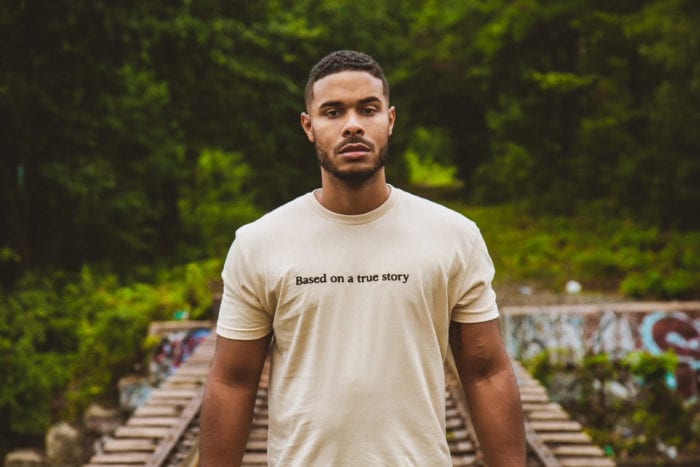
“When I’m going to a show … I’m going in and I’m gonna give this my all.”
Suriel first began to see his hard work pay off in 2019, soon after the release of his Blank Slate EP. Not long after that, the Lynn-based artist’s video for the track “S.L.P.” premiered on BET Jams, followed by love from NPR and videos clocking tens of thousands of views as icing on the cake.
His climb hasn’t had the usual hurdles. While things have gone well for him in music, over the past few years, Suriel has had to recuperate from an unexpected seizure, which hasn’t slowed him down. His manager Mike told the Dig, “I have seen him grow on the artistry side, from being able to make more in-depth music and quicker, but he has also grown massively on the other side, the toughest side of it, which is the business side.”
I asked Suriel some questions, and he explained the rest.
How does the environment that you grew up in have an impact on your music?
I learned a lot from moving around a lot and I met a lot of people. One thing I learned was I was pretty much able to fit in with everybody without having to be fake. I learned how to chill with anybody and not have to feel uncomfortable. I think that goes into my music pretty well. I feel a lot of people can relate.
What’s been your journey so far?
I put out my first project in 2018. It received so much love from the city and NPR rated it one of the top albums of 2018 in Boston. That was dope. It was a good look for me. I was doing shows anywhere, open mics anywhere. After Blank Slate dropped, I was able to do my show. We were putting out music and singles and started to get traction and a lot of people going. We had our first headlining show the following April.
What is the difference between preparing to go in the studio compared to getting ready for a show?
It is a completely different approach. When I’m going to the studio, I’m trying to be more aware of how I’m feeling and more aware of the vibes, it’s more of a reaction to me. … When I’m going to a show … I’m going in and I’m gonna give this my all and I’m going to kill this shit. It’s like game day for an athlete.
How important is mental health?
I just turned 25. I was 23 when the seizure happened. … I [had] neglected [my] health since I was not working out, not eating healthy, was not getting rest or listening to the positive stuff. I was going on my energy and what I had in me. Led to me drinking six coffees a day to keep up. I was sleeping three to four hours a night, that’s what led to the seizure, so when I was at the hospital for two days, they ran all kinds of tests on me and found out there was no real reason, there’s nothing wrong with me that’s going to cause it to happen again. They told me I need to chill, relax, and get some sleep. After that point, I had to make a change for my sanity.
What was the deciding factor in making a short film for “What Can I Say”?
I had a crazy story I just went through, but I’m like, It’s mad personal. They said I should think about [sharing it]. One of the things we aim to do is make something that is going to be impactful, something that people are going to remember and carries some emotional weight to it. That’s some of the best art to me and that’s what moves me. I told them what I went through and that we should make a short film.
I had a really good time making that project even though I had to act [and] those scenes were very real to me. I still had to act. It was fun getting into character. I love making short films, I like the media aspect of it and just using a different outlet gives me the opportunity for more creative input.
How have you seen the music scene here grow over the past couple of years?
I feel I happened to get into it at the right time. This is the start of a very big movement. The talent and with individuals like Millyz having a really big audience right now is important. Millyz is always someone who is going to uplift people. Joyner [Lucas] at his level and where he is at. That is important, to have those iconic figures for us to say these are those guys. That opens up doors for anybody else now, so I feel like we are open, we have an opportunity now for sure to get to whatever you want to do. Before it did not feel like that, to be honest with you, you got to do a lot but now you just got to do you.
What are some of the solutions you put in place for yourself moving forward?
For the most part, I’m eating well and incorporating fitness in my daily routine. That helps me keep sharp and when I’m tired, I go to sleep, simple as that. I see the difference it makes for me in the studio. I understand that I have to rest and take care of myself and that leads to better music, better presentation, better everything.
My whole life is better and my positivity is more natural. I genuinely feel great all the time. That’s how I want to feel.
Derek welcome born & raised in Boston, MA.

